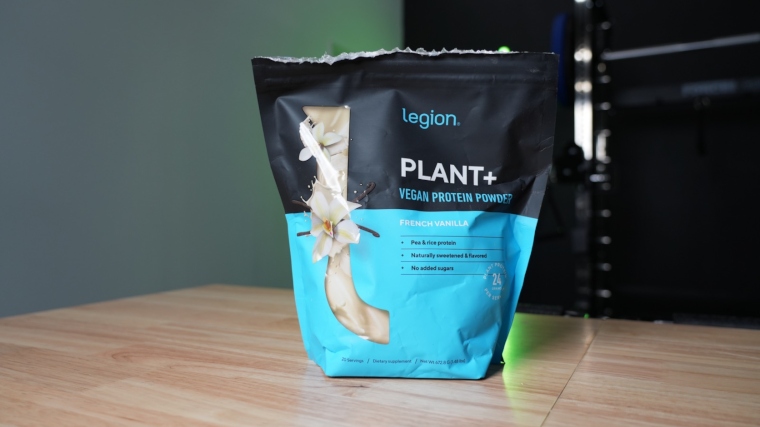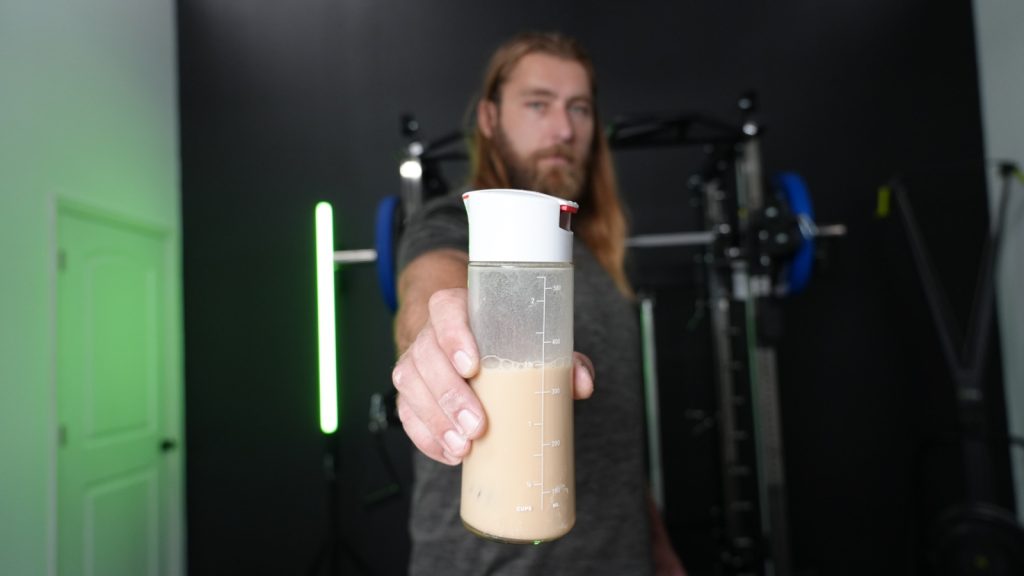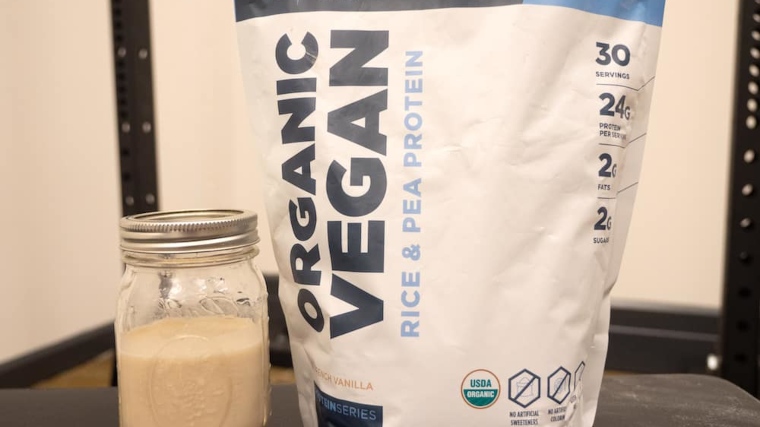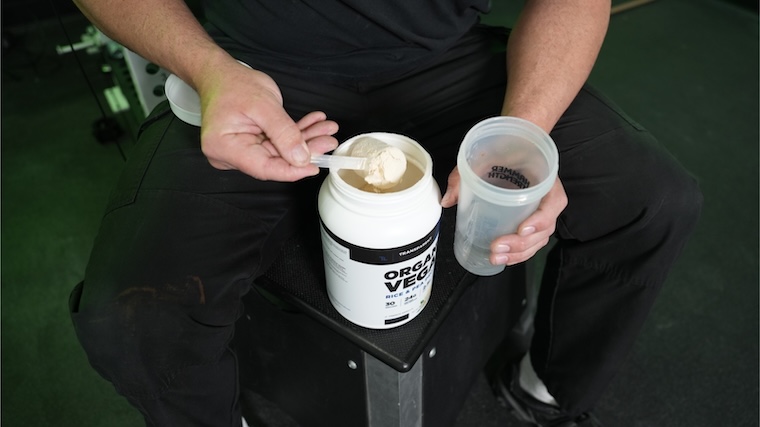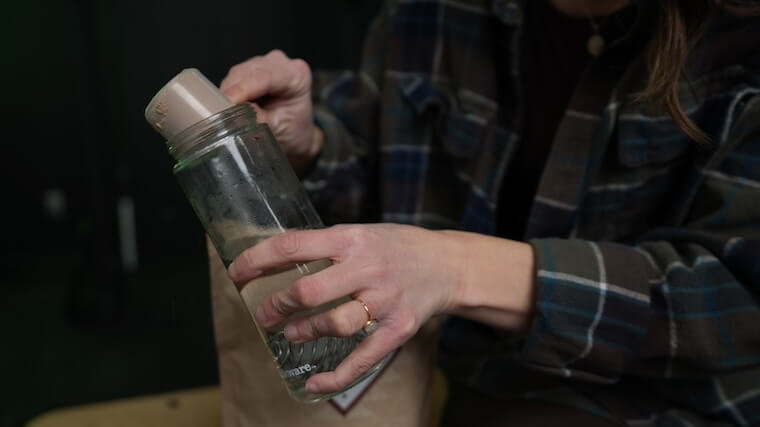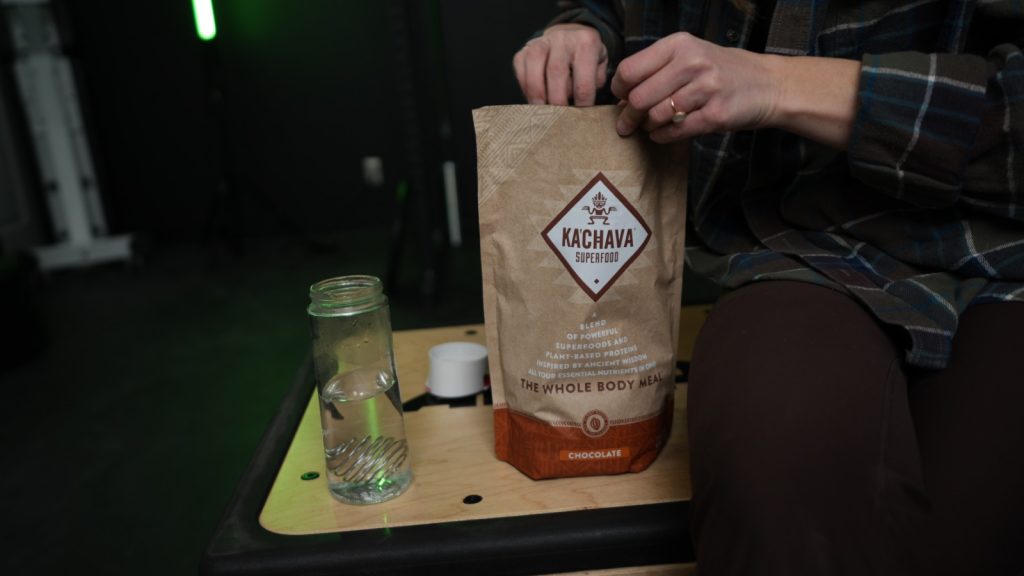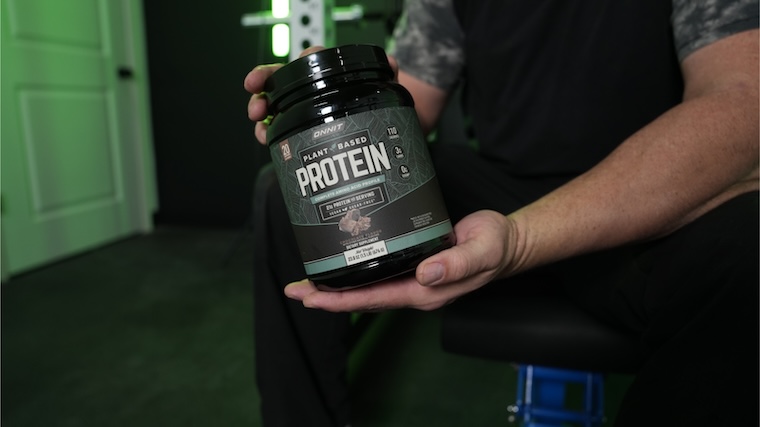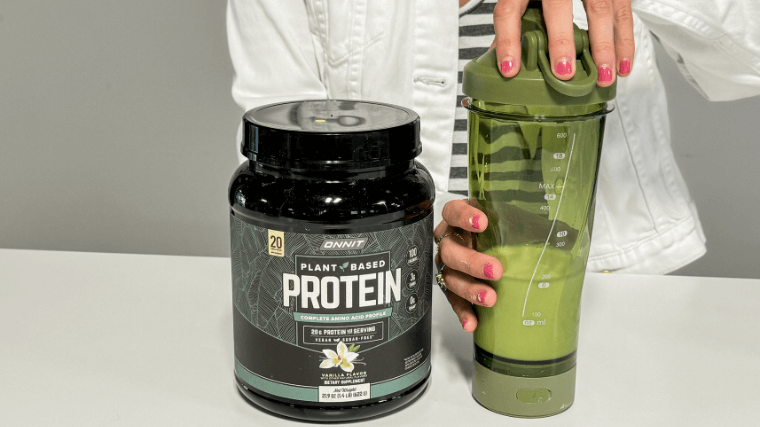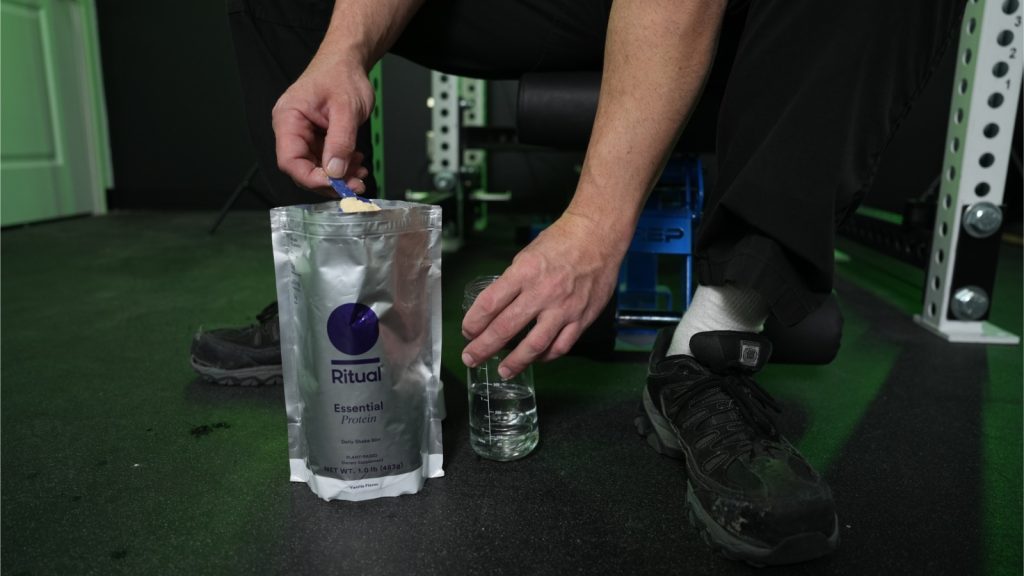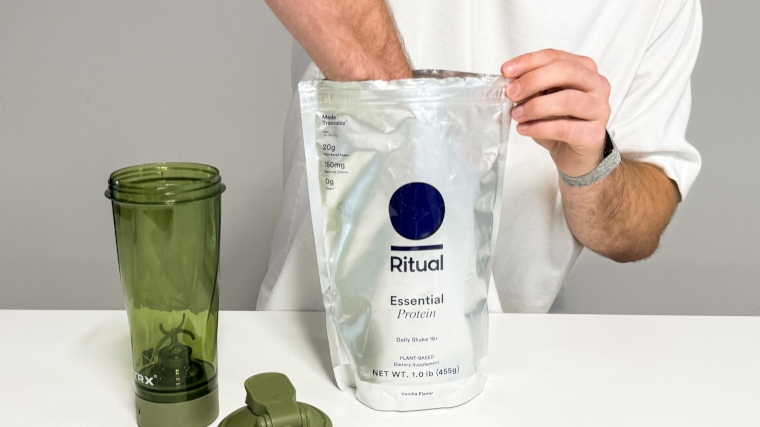If you’re looking to increase strength, support muscular hypertrophy, and boost your immunity to keep you healthy, the best protein powders can be a handy elixir to keep up with your fitness goals. (1)(2) However, if your insides don’t take too kindly to dairy products like whey and casein protein, the best dairy-free protein powders will be your light in the darkness. With plant-based protein sources like peas, brown rice, soy, hemp, and more, you won’t need to suckle from the teat of a cow to build Hulk-like shoulders.
Whether you’re vegan, lactose intolerant, or have milk sensitivities, there are a number of dairy-free options to support your protein goals. Just take a peek into any vitamin store and you’ll be inundated with large tubs filled with fine powder (and even finer print). The BarBend team has tried and tested more than 100 protein powders to point you in the right direction of the best options out there, using our supplement testing methodology to rate and examine top-performing profiles. With the help of registered dietitians, we’ve compiled our picks for the best dairy-free protein powders on the market.
Transparency Notice: BarBend and Swolverine are both owned by the same parent company. We maintain the same rigorous testing standards and objective review process for all products we evaluate. Our commitment to providing honest, evidence-based reviews remains unchanged regardless of ownership.
The 8 Best Dairy-Free Protein Powders of 2025
- Best Dairy-Free Protein Powder Overall: Legion Plant+ Non-GMO Plant-Based Protein Powder
- Best Dairy-Free Protein Powder Formula: Transparent Labs Organic Vegan Protein Powder
- Best Dairy-Free Protein Powder for Athletes: Ka’Chava The Whole Body Meal
- Best Tasting Dairy-Free Protein Powder: Onnit Plant-Based Protein
- Best Dairy-Free Protein Powder for Weight Loss: Ritual Essential Protein Daily Shake 18+
- Best Dairy-Free Protein Powder for Building Muscle: Momentous Essential Plant-Based Protein
- Best Low-Carb Dairy-Free Protein Powder: Swolverine Plant Protein
- Best Budget Dairy-Free Protein Powder: Bulk Supplements Organic Pea Protein Isolate Powder
Editor’s note: The content on BarBend is meant to be informative in nature, but it should not be taken as medical advice. The opinions and articles on this site are not intended for use as diagnosis, prevention, and/or treatment of health problems. It’s always a good idea to talk to your doctor before beginning a new fitness, nutritional, and/or supplement routine. Individual needs for vitamins and minerals will vary.
Best Dairy-Free Protein Powder Overall: Legion Plant+ Non-GMO Plant-Based Protein Powder
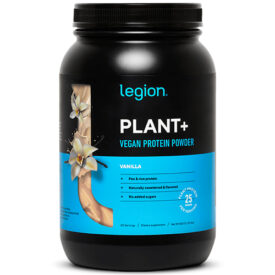
Legion Plant+ Non-GMO Plant-Based Protein Powder has 25 grams of protein per serving, just four grams of carbs, and is packed with vitamins and minerals that plant-based eaters may want more of. Use code "BARBEND" for 20% off!
Specs
- Price Per Serving: $2.49
- Protein Source: Pea protein and rice protein
- Protein Per Serving: 24g-25g
- Calories Per Serving: 130-140
- Third-Party Testing: Yes
- Available Flavors: Chocolate, Mocha Cappuccino, Vanilla, Salted Caramel, Cinnamon Cereal, Apple Pie
Best Dairy-Free Protein Powder Formula: Transparent Labs Organic Vegan Protein Powder
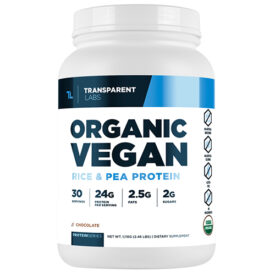
A surprisingly delicious vegan protein powder that's totally free from artificial ingredients and soy, Transparent Labs Organic Vegan Protein contains a 2:1 ratio of rice to pea protein powder, and four grams of fiber.
Specs
- Price Per Serving: $1.67
- Protein Source: Organic rice protein, organic pea protein
- Protein Per Serving: 24g
- Calories Per Serving: 130-140
- Third-Party Testing: Yes (Informed Protein)
- Available Flavors: Chocolate, French Vanilla
Best Dairy-Free Protein Powder for Athletes: Ka’Chava The Whole Body Meal
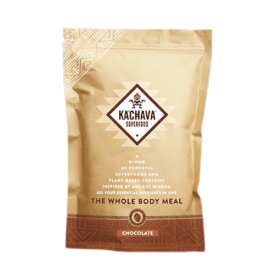
This vegan meal replacement offers various superfood blends that include organic fruits, vegetables, mushrooms, enzymes and probiotics. It totals 240 calories, 25 grams of plant-based protein, 25 grams of carbohydrates (including seven grams of fiber), and seven grams of fat.
Specs
- Price Per Serving: $4.66
- Protein Source: Yellow pea protein, brown rice, sacha inchi, amaranth, quinoa
- Protein Per Serving: 25g
- Calories Per Serving: 240
- Third-Party Testing: Yes
- Available Flavors: Vanilla, Chocolate, Coconut Acai, Chai, Matcha
Best-Tasting Dairy-Free Protein Powder: Onnit Plant-Based Protein
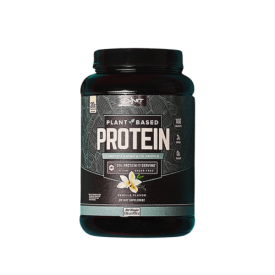
This plant-based protein powder is dairy, soy, and gluten-free, with 20 grams of protein, 1 gram of fat, and 3 grams of carb in each 100-calorie serving
Specs
- Price Per Serving: $2.25
- Protein Source: Pea protein, pumpkin seed protein, sunflower seed protein, watermelon seed protein
- Protein Per Serving: 20g
- Calories Per Serving: 100-110
- Third-Party Testing: No
- Available Flavors: Vanilla, Chocolate
Best Dairy-Free Protein Powder for Weight Loss: Ritual Essential Protein Daily Shake 18+
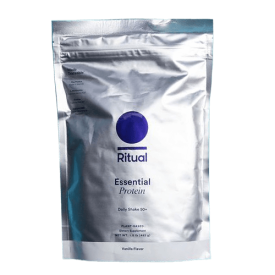
This clean, transparent protein powder relies on organic, non-GMO yellow peas for its 20-gram protein dosage. Additionally, the subscription-based model helps ensure you’re always stocked up to help you meet your nutritional goals day in and day out.
Specs
- Price Per Serving: $2.93
- Protein Source: Organic pea protein
- Protein Per Serving: 20g
- Calories Per Serving: 115
- Third-Party Testing: Yes (Clean Label Project)
- Available Flavors: Vanilla
Best Dairy-Free Protein Powder for Building Muscle: Momentous Essential Plant-Based Protein
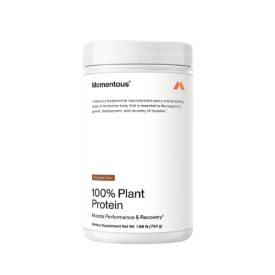
Improve muscle recovery, strength, and endurance with 20 grams of protein, 10 grams of carbohydrates, and 3 grams of fat in this plant-based protein.
Specs
- Price Per Serving: $2.27
- Protein Source: Pea protein and rice protein
- Protein Per Serving: 20g
- Calories Per Serving: 140
- Third-Party Testing: Yes
- Available Flavors: Vanilla Chai, Chocolate
Best Low-Carb Dairy-Free Protein Powder: Swolverine Plant Protein
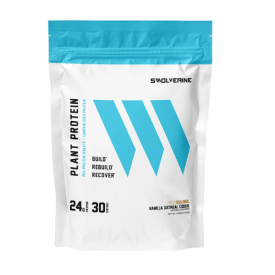
Specs
- Price Per Serving: $2.16
- Protein Source: Pea protein isolate and pumpkin seed protein
- Protein Per Serving: 24g
- Calories Per Serving: 140
- Third-Party Testing: Yes
- Available Flavors: Chocolate, Salted Caramel, Vanilla Oatmeal Cookie
Best Budget Dairy-Free Protein Powder: Bulk Supplements Organic Pea Protein Isolate Powder
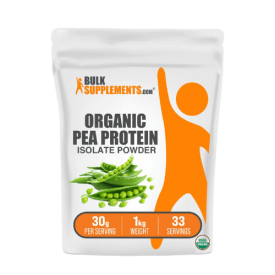
Vegan, organic, and lactose-free, this protein powder provides 21 grams of protein, 2.6 grams of fat, and 0 carbs per serving.
Specs
- Price Per Serving: Starting at $0.70
- Protein Source: Pea protein
- Protein Per Serving: 21g
- Calories Per Serving: 100
- Third-Party Testing: Yes
- Available Flavors: Unflavored
How We Tested and Chose the Best Dairy-Free Protein Powders
We love our protein shakes here at BarBend, and our roster of personal trainers, CrossFit athletes, and certified nutrition coaches has tried out more than 100 of the most popular protein powders on the market. To convey our findings on the best dairy-free protein powders, we’ve utilized BarBend’s supplement testing methodology, rating categories such as formulation, transparency, and taste on a scale of 1 (not good) to 5 (we love it).
- Protein Source: All of the protein powders on this list use an alternative source of protein in place of dairy ingredients such as casein and whey protein. We looked for options with pea protein, rice protein, egg whites, and more.
- Price: Dairy-free protein powders tend to be more expensive per serving than whey protein powders — averaging between $2 and $2.50 per serving, as compared to whey protein, which tends to cost between $1 and $2 per serving. When our choices exceeded this average, we made sure to note it and explain why it was worth the added cash.
- Protein Per Serving: The recommended daily protein intake is 0.36 grams per pound and can increase depending on your training and needs. (3) As such, we looked for options that provided at least 20 grams of protein per serving to help you reach your daily needs.
- Calories Per Serving: We sought to choose options with between 100 and 140 calories per serving, though some options with a wider range of macros exceed that.
- Third-Party Testing: Knowing what you’re putting in your body is important, so we looked for protein powders with third-party testing to provide peace of mind and transparency about what exactly is in the protein powder. This is especially important for competitive athletes who follow governing agencies’ rules regarding what they can and can’t put in their bodies.
- Taste: While palates and preferences will vary from person to person, our team sought to select some of the best-tasting protein powders for this list based on their personal tasting experience.
What To Consider Before Buying a Dairy-Free Protein Powder
If you’re following a plant-based diet or dairy products cause some rumblin’ in the tummy, there are several dairy-free protein options on the market, from hemp protein, soy protein, egg whites, and pea protein to chia seeds, pumpkin seeds, and sunflower seeds. Before you pick up your next gains-boosting fuel, consider your fitness routine, budget, and taste preferences to help you dial in on the perfect protein powder for you.
Your Protein Needs
How much protein do you need? We know that protein is essential for building muscle, but how much of it do you need for your body to do its job properly? “Consume protein with all of your meals and have one or two protein shakes a day, that’s going to be enough for most people to produce a measurable effect on body composition, especially people who don’t want to think of it that much,” says BarBend tester Nick English in the video review below.
The next question to ask yourself is: How much protein should I get per meal? Well, there’s a fairly definitive range to shoot for.
“It was widely believed that the body can only absorb 20 grams of protein at a time,” BarBend expert reviewer Austin Bou, RD, CDCES, ACE-CPT, says. “In reality, the body can absorb and utilize protein efficiently throughout the day. Research shows that optimal protein intake should be around 20-40 grams per meal for most people.”
If you’re looking to track your protein more closely, the International Society of Sports Nutrition recommends 1.4 to 2 grams of protein per kilogram of body weight per day. (17)
Calories Per Serving
Most dairy-free protein powders provide between 100 and 140 calories per serving, which is an easy way to keep you satiated between meals without ruining your appetite. Take stock of your fitness goals and how many calories would best suit you.
If you’re in a loading phase and working on adding muscle, consider a protein powder with more calories to support your energy levels and make sure you have enough fuel in your body to build more muscle. If you’re in a cutting phase, consider a protein powder with fewer calories so you can remain in a calorie deficit while still hitting your protein goals.
What Ingredients Suit Your System
While you may be here because you know you want to avoid dairy and lactose in your protein — casein and whey protein are out of the equation — consider what other dietary needs or restrictions suit your body and lifestyle. Do you prefer how pea protein makes you feel versus egg whites? Maybe a protein blend that includes brown rice protein sits best post-workout. There are tons of options out there, carefully curated to suit all types of bodies and needs.
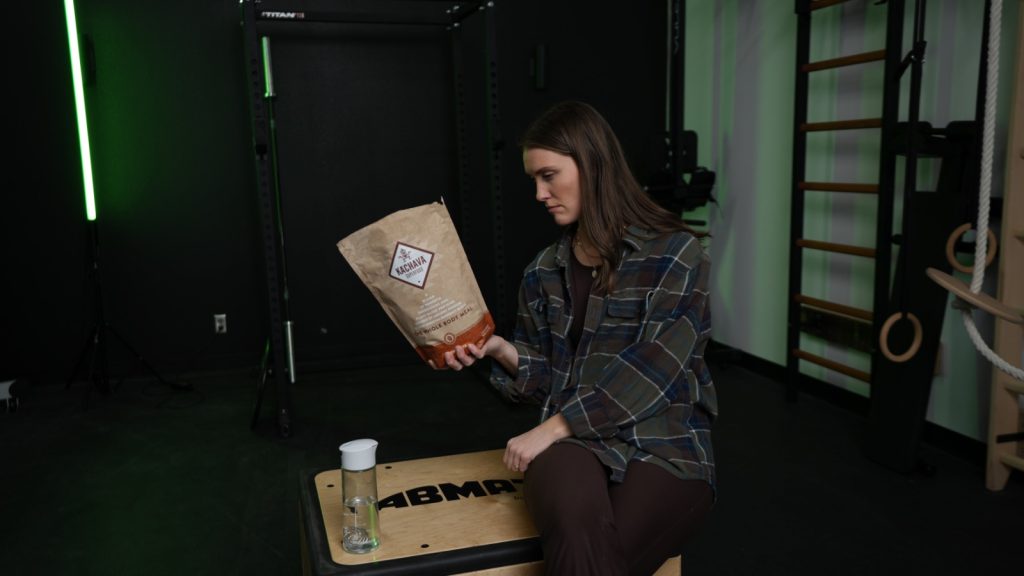
Those managing celiac disease may need a protein powder that’s verified gluten-free, since cross-contamination with gluten during manufacturing can occur. (18) Additionally, some individuals managing IBS or autoimmune diseases, such as Hashimoto’s, may also be interested in cutting out gluten in an effort to nail down if certain foods are causing inflammation. (19)
However, studies about gluten and its effect on certain illnesses are conflicting, so you’ll want to consult with your doctor or take your gluten-free protein shake with a grain of salt. (Not literally with salt, just don’t expect a gluten-free diet to solve all of your woes.)
If you’ve noticed digestive issues with other dairy-free protein powders, here are some additional ingredients to keep your eye on when trying to figure out the tummy-rumbling culprit: artificial sweeteners like erythritol and sorbitol can be hard to digest and cause gas and bloating; inulin can cause bloating and gas; and xanthan gum can swell in the intestine, which can cause abdominal discomfort. (20)(21)(22)
Kidney Disease
While a high-protein diet can be great for healthy individuals, those with kidney disease will want to take extra precautions when introducing protein shakes into their routine. As recommended by The National Kidney Foundation, people with chronic kidney disease should limit their protein intake to between 0.6 and 0.75 grams of protein per kilogram of body weight. (23)
Price
Price is dictated by several factors, including the type and quality of ingredients used, the macro split, the amount of protein included, as well as taste and solubility. The average dairy-free protein powder will cost between $2 and $2.50 per serving, but our list provides options ranging from as low as $0.70 to as high as $4.66 per serving. Products with a lower price point often include only one or two ingredients, while higher-priced options feature a wider range of micronutrients and balanced macros for a more satiating drinky drink.
Some of the additions that can raise the cost of dairy-free protein powders include essential and non-essential amino acids, BCAAs, and protein blends that incorporate a mixture of more than one protein source.
While the average protein powder tends to cost between $1 and $2 per serving, dairy-free protein powders tend to be more expensive because they may require more rigorous testing to certify that they’re providing what’s being promised: vegan, gluten-free, organic, non-GMO, etc.
Benefits of Dairy-Free Protein Powders
Protein powder benefits are wide and expansive, from aiding in building muscle to helping keep consumers satiated. Dairy-free protein powders don’t include dairy or lactose ingredients, so here are some specific benefits you can expect from them, as well.
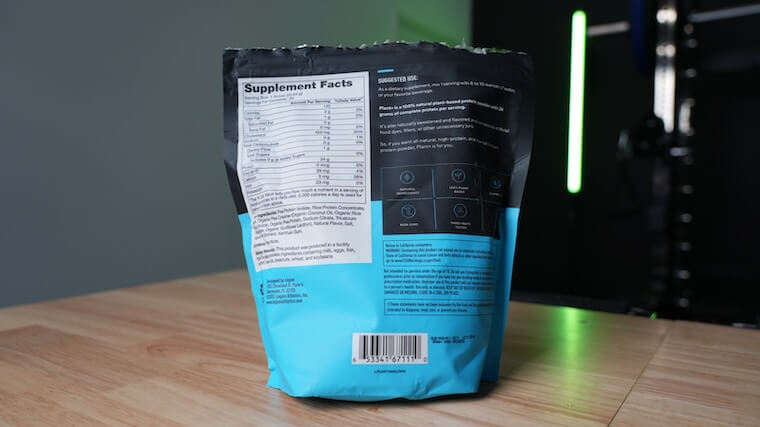
- Can Help Support Weight Loss: Protein is scientifically shown to aid in weight loss and weight maintenance thanks to its ability to help keep you feeling fuller for longer than fats or carbohydrates can. (24)(25)
- Easier to Digest: One of the most common side effects of whey protein powder is an upset stomach or digestive issues. Cutting out whey and casein in favor of plant-based proteins tends to be easier on the digestive system, allowing your body to more easily digest and utilize the protein you’ve ingested.
- Good for Animals and the Planet: By avoiding dairy in your protein shake, you’re helping to avoid factory-farmed animal products. This can help limit animal cruelty and environmental impact. While there’s environmental impact from both animal products and plant-based products, factory-farmed animal products can cause greenhouse gas emissions, biodiversity loss, and disease, as well as excessive consumption of food and water. (26)
How Much Do Dairy-Free Protein Powders Cost?
Dairy-free protein powders average around $2 to $2.50 per serving, unlike the best whey protein powders, which tend to cost between $1 and $2 per serving. Our list includes options between $0.70 and $4.66 per serving.
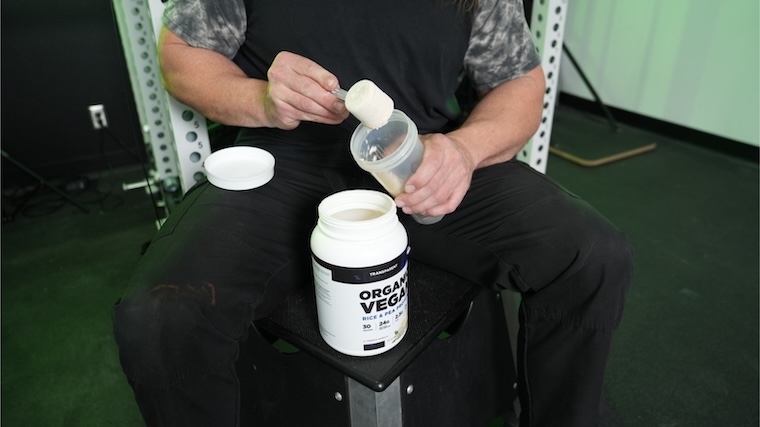
Lower-priced options tend to include fewer ingredients while higher-priced powders pack in a wider range of nutrients, providing a more well-rounded pre- or post-workout snack (and sometimes a full meal replacement).
| Best Dairy-Free Protein Powder Overall | Legion Plant+ Non-GMO Plant-Based Protein Powder | $2.49/serving |
| Best Dairy-Free Protein Powder Formula | Transparent Labs Organic Vegan Protein Powder | $1.67/serving |
| Best Dairy-Free Protein Powder for Athletes | Ka’Chava The Whole Body Meal | $4.66/serving |
| Best Tasting Dairy-Free Protein Powder | Onnit Plant-Based Protein | $2.25/serving |
| Best Dairy-Free Protein Powder for Weight Loss | Ritual Essential Protein Daily | $2.93/serving |
| Best Dairy-Free Protein Powder for Building Muscle | Momentous Essential Plant-Based Protein | $2.27/serving |
| Best Low-Carb Dairy-Free Protein Powder | Swolverine Plant Protein | $2.16/serving |
| Best Budget Dairy-Free Protein Powder | Bulk Supplements Organic Pea Protein Isolate Powder | Starting at $0.70/serving |
Dairy-Free Protein Powders FAQs
What is the best dairy-free protein powder?
We’ve tasted more than 100 different protein powders in our quest for the best of the best, and when it comes to our choice of the best dairy-free protein powder, we think Legion Plant+ Non-GMO Plant-Based Protein Powder comes out on top. With 24 to 25 grams of protein, 4 grams of fat, 5 grams of carbs, and 140 calories per serving, you can treat your sweet tooth with flavors like Salted Caramel, Cinnamon Cereal, and Apple Pie without any added sugar.
How much do dairy-free protein powders cost?
While the average dairy-free protein powder costs between $2 and $2.50 per serving, dairy-free protein powders on our list range in price from $0.70 to $4.66 per serving. More cost-friendly options have fewer ingredients, while higher-priced options often include complete amino acid profiles, BCAAs, and additional high-quality ingredients to support your fitness goals.
Is dairy-free protein powder good for you?
Yes! There are loads of benefits associated with dairy-free protein powders, including less abdominal discomfort and gastrointestinal issues, which some people may experience with whey and casein protein sources. For individuals who are lactose intolerant or have milk allergies, a dairy-free protein powder is a great way to have easy access to added protein in their diets without the side effects that dairy products may cause them. (27)
References
- Wu G. (2016). Dietary protein intake and human health. Food & function, 7(3), 1251–1265. https://doi.org/10.1039/c5fo01530h
- Li, P., Yin, Y. L., Li, D., Kim, S. W., & Wu, G. (2007). Amino acids and immune function. The British journal of nutrition, 98(2), 237–252. https://doi.org/10.1017/S000711450769936X
- Harvard Health. (2023, June 22). How much protein do you need every day? https://www.health.harvard.edu/blog/how-much-protein-do-you-need-every-day-201506188096
- Nutrition, C. F. F. S. a. A. (2024, March 5). Sodium in your diet. U.S. Food And Drug Administration. https://www.fda.gov/food/nutrition-education-resources-materials/sodium-your-diet#:~:text=Know%20Your%20Numbers,Tips%20for%20Reducing%20Sodium%20Consumption
- Cermak, N. M., & van Loon, L. J. (2013). The use of carbohydrates during exercise as an ergogenic aid. Sports medicine (Auckland, N.Z.), 43(11), 1139–1155. https://doi.org/10.1007/s40279-013-0079-0
- Shuler, F. D., Wingate, M. K., Moore, G. H., & Giangarra, C. (2012). Sports health benefits of vitamin d. Sports health, 4(6), 496–501. https://doi.org/10.1177/1941738112461621
- Wang, J., & Ji, H. (2019). Influence of Probiotics on Dietary Protein Digestion and Utilization in the Gastrointestinal Tract. Current protein & peptide science, 20(2), 125–131. https://doi.org/10.2174/1389203719666180517100339
- Nutrition, C. F. F. S. a. A. (2024b, March 5). Sodium in your diet. U.S. Food And Drug Administration. https://www.fda.gov/food/nutrition-education-resources-materials/sodium-your-diet#:~:text=Know%20Your%20Numbers,Tips%20for%20Reducing%20Sodium%20Consumption
- Kreider, R. B., Miriel, V., & Bertun, E. (1993). Amino acid supplementation and exercise performance. Analysis of the proposed ergogenic value. Sports medicine (Auckland, N.Z.), 16(3), 190–209. https://doi.org/10.2165/00007256-199316030-00004
- Kim J. Y. (2021). Optimal Diet Strategies for Weight Loss and Weight Loss Maintenance. Journal of obesity & metabolic syndrome, 30(1), 20–31. https://doi.org/10.7570/jomes20065
- Church, D. D., Hirsch, K. R., Park, S., Kim, I. Y., Gwin, J. A., Pasiakos, S. M., Wolfe, R. R., & Ferrando, A. A. (2020). Essential Amino Acids and Protein Synthesis: Insights into Maximizing the Muscle and Whole-Body Response to Feeding. Nutrients, 12(12), 3717. https://doi.org/10.3390/nu12123717
- Cava, E., Yeat, N. C., & Mittendorfer, B. (2017). Preserving Healthy Muscle during Weight Loss. Advances in nutrition (Bethesda, Md.), 8(3), 511–519. https://doi.org/10.3945/an.116.014506
- Baranauskas, M., Kupčiūnaitė, I., & Stukas, R. (2023). Dietary Intake of Protein and Essential Amino Acids for Sustainable Muscle Development in Elite Male Athletes. Nutrients, 15(18), 4003. https://doi.org/10.3390/nu15184003
- Lopez, M. J., & Mohiuddin, S. S. (2024). Biochemistry, Essential Amino Acids. In StatPearls. StatPearls Publishing.
- Mooradian A. D. (2020). The Merits and the Pitfalls of Low Carbohydrate Diet: A Concise Review. The journal of nutrition, health & aging, 24(7), 805–808. https://doi.org/10.1007/s12603-020-1417-1
- Mooradian A. D. (2020). The Merits and the Pitfalls of Low Carbohydrate Diet: A Concise Review. The journal of nutrition, health & aging, 24(7), 805–808. https://doi.org/10.1007/s12603-020-1417-1
- Campbell, B., Kreider, R. B., Ziegenfuss, T., La Bounty, P., Roberts, M., Burke, D., Landis, J., Lopez, H., & Antonio, J. (2007). International Society of Sports Nutrition position stand: protein and exercise. Journal of the International Society of Sports Nutrition, 4, 8. https://doi.org/10.1186/1550-2783-4-8
- Bascuñán, K. A., Vespa, M. C., & Araya, M. (2017). Celiac disease: understanding the gluten-free diet. European journal of nutrition, 56(2), 449–459. https://doi.org/10.1007/s00394-016-1238-5
- Passali, M., Josefsen, K., Frederiksen, J. L., & Antvorskov, J. C. (2020). Current Evidence on the Efficacy of Gluten-Free Diets in Multiple Sclerosis, Psoriasis, Type 1 Diabetes and Autoimmune Thyroid Diseases. Nutrients, 12(8), 2316. https://doi.org/10.3390/nu12082316
- Spencer, M., Gupta, A., Dam, L. V., Shannon, C., Menees, S., & Chey, W. D. (2016). Artificial Sweeteners: A Systematic Review and Primer for Gastroenterologists. Journal of neurogastroenterology and motility, 22(2), 168–180. https://doi.org/10.5056/jnm15206
- Sheng, W., Ji, G., & Zhang, L. (2023). Immunomodulatory effects of inulin and its intestinal metabolites. Frontiers in immunology, 14, 1224092. https://doi.org/10.3389/fimmu.2023.1224092
- EFSA Panel on Food Additives and Nutrient Sources added to Food (ANS), Mortensen, A., Aguilar, F., Crebelli, R., Di Domenico, A., Frutos, M. J., Galtier, P., Gott, D., Gundert-Remy, U., Lambré, C., Leblanc, J. C., Lindtner, O., Moldeus, P., Mosesso, P., Oskarsson, A., Parent-Massin, D., Stankovic, I., Waalkens-Berendsen, I., Woutersen, R. A., Wright, M., … Dusemund, B. (2017). Re-evaluation of xanthan gum (E 415) as a food additive. EFSA journal. European Food Safety Authority, 15(7), e04909. https://doi.org/10.2903/j.efsa.2017.4909
- Cuenca-Sánchez, M., Navas-Carrillo, D., & Orenes-Piñero, E. (2015). Controversies surrounding high-protein diet intake: satiating effect and kidney and bone health. Advances in nutrition (Bethesda, Md.), 6(3), 260–266. https://doi.org/10.3945/an.114.007716
- Halton, T. L., & Hu, F. B. (2004). The effects of high protein diets on thermogenesis, satiety and weight loss: a critical review. Journal of the American College of Nutrition, 23(5), 373–385. https://doi.org/10.1080/07315724.2004.10719381
- Veldhorst, M., Smeets, A., Soenen, S., Hochstenbach-Waelen, A., Hursel, R., Diepvens, K., Lejeune, M., Luscombe-Marsh, N., & Westerterp-Plantenga, M. (2008). Protein-induced satiety: effects and mechanisms of different proteins. Physiology & behavior, 94(2), 300–307. https://doi.org/10.1016/j.physbeh.2008.01.003
- Filippin, D., Sarni, A. R., Rizzo, G., & Baroni, L. (2023). Environmental Impact of Two Plant-Based, Isocaloric and Isoproteic Diets: The Vegan Diet vs. the Mediterranean Diet. International journal of environmental research and public health, 20(5), 3797. https://doi.org/10.3390/ijerph20053797
- Malik, T. F., & Panuganti, K. K. (2023). Lactose Intolerance. In StatPearls. StatPearls Publishing.
